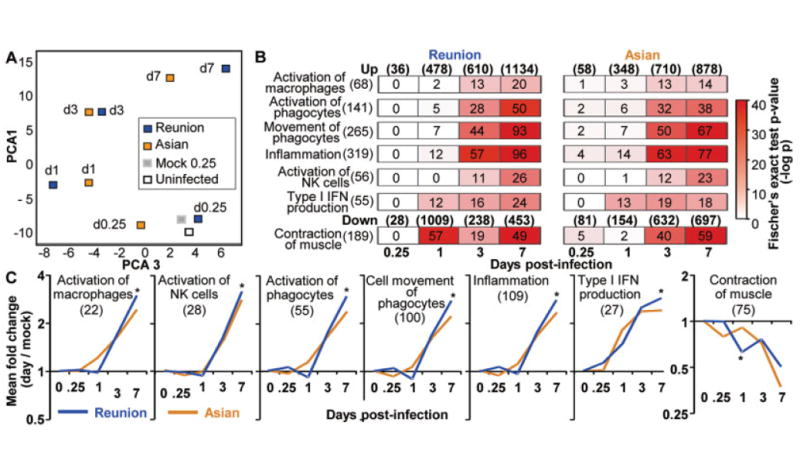Gene profiling of Chikungunya virus arthritis in a mouse model reveals significant overlap with rheumatoid arthritis.
Chikungunya virus (CHIKV) is a mosquito-borne alphavirus that causes a chronic debilitating polyarthralgia/polyarthritis, for which current treatments are often inadequate. To assess whether new drugs being developed for rheumatoid arthritis (RA) might find utility in the treatment of alphaviral arthritides, we sought to determine whether the inflammatory gene expression signature of CHIKV arthritis shows any similarities with RA or collagen-induced arthritis (CIA), a mouse model of RA. Using a recently developed animal model of CHIKV arthritis in adult wild-type mice, we generated a consensus CHIKV arthritis gene expression signature, which was used to interrogate publicly available microarray studies of RA and CIA. Pathway analyses were then performed using the overlapping gene signatures. Gene set enrichment analysis showed that there was a highly significant overlap in the differentially expressed genes in the CHIKV arthritis model and in RA. This concordance also increased with the severity of RA, as measured by the inflammation score. A highly significant overlap was also seen between CHIKV arthritis and CIA. Pathway analysis revealed that the overlap between these arthritides was spread over a range of different inflammatory processes. Involvement of T cells and interferon-γ (IFNγ) in CHIKV arthritis was confirmed in studies of MHCII-deficient mice and IFNγ-deficient mice, respectively. These results suggest that RA, a chronic autoimmune arthritis, and CHIKV disease, usually a self-limiting viral arthropathy, share multiple inflammatory processes. New drugs and biologic therapies being developed for RA may thus find application in the treatment of alphaviral arthritides.
Authors
Helder I Nakaya; Joy Gardner; Yee-Suan Poo; Lee Major; Bali Pulendran; Andreas Suhrbier
External link
Publication Year
Publication Journal
Associeted Project
Systems Immunology of Human Diseases
Lista de serviços
-
Is the gut microbiome key to modulating vaccine efficacy?Is the gut microbiome key to modulating vaccine efficacy?
-
Toxicogenomic and bioinformatics platforms to identify key molecular mechanisms of a curcumin-analogue DM-1 toxicity in melanoma cells.Toxicogenomic and bioinformatics platforms to identify key molecular mechanisms of a curcumin-analogue DM-1 toxicity in melanoma cells.

